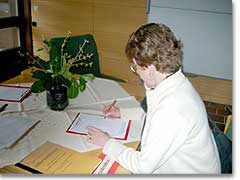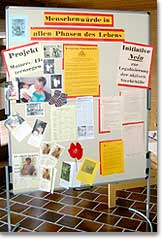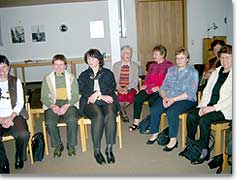 |
|
Sigue la Campaña de firmas en contra de la legalización de la eutanasia The Campaign against the legalization of euthanasia continues Die Unterschriftenaktion gegen die Legalisierung der aktiven Sterbehilfe geht weiter |
|
 |
|
Stand en la Casa Marienland, Schoenstatt Stand in House Marienland, Schönstatt Infostand in Haus Marienland, Schönstatt |
|
 |
|
Helga Rupp (centro), en un intercambio en Schoenstatt Helga Rupp (center), during a discussion in Schoenstatt Helga Rupp, (hinten Mitte) bei einem Gespräch in Schönstatt Fotos: POS Fischer © 2004 |
|
|
SCHOENSTATT, mkf. "Human dignity at every stage of life – Say no to the legalization of euthanasia." For weeks this subject has been hotly debated in Schoenstatt and wherever Schoenstatt members meet. This discussion has been ignited by the attempt in the Council of Europe to legalize euthanasia. Helga Rupp, qualified theatre nurse, and deputy diocesan leader of the Schoenstatt mothers and professional women in the Diocese of Rottenburg-Stuttgart, was one of a small group of Schoenstatt women who decided at the end of January to start a campaign to collect signatures.
The second reading of Nr. 9898 "EUTHANASIA" had just been placed on the agenda for the plenary session of the Council of Europe. It recommends that the 45 members states should grant freedom from prosecution under certain conditions to doctors who actively promote euthanasia. Until now euthanasia has only been legalized in the Netherlands, Belgium and the US state of Oregon. "I don’t want my children to ask me one day why I did nothing to prevent this while it was still possible," Helga Rupp explained to a week-end course in Haus Marienland, Vallendar. "We are living in a democracy, we can move things politically, and so we also have to do it. Today the dignity of human beings and the protection of human life is at stake."
In the meantime many hundreds of signatures have been collected. During the above-mentioned week-end course over ten lists were collected, in addition six lists sent in by Christiana von Habsburg-Lothringen from Vienna and Hungary. When we first made contact with her, she said she would "naturally" take part and support this initiative.
This campaign is now receiving support from many sides. Cardinal Christoph Schoenborn and Auxiliary Bishop Ludwig Schwartz of Vienna have also expressed their support.
"... the calls for a (financial) solution grow louder"
Elke Bartz, Chair of the "Forum for Right of the Disabled to receive Self-Determined Assistance", has wished the Schoenstatt Movement "every success in this important work." The results of the reform to the health system have given rise to justified concern. If the costs of providing nursing care for "Ouma Meier" continue to rise, the call for a (financial) solution will grow louder". In an article for the above Forum she wrote, "Using the excuse of preventing unbearable suffering and pain, people are demanding that "humane" death should be made possible, and that "help" should be given to those people to end their lives who are no longer able to do so for themselves. No one wants to die with unbearable pain. No one wants to be connected to machines, or to be forced to be kept alive artificially against their wills. Situations constantly arise in which death seems to be the more merciful solution than having to bear what is subjectively experienced as unbearable suffering. However, can this justify legalization of active euthanasia?" She points out clearly that the recent debate has been ignited by financial considerations, "The desire of mainly old and ill, also disabled people, to die is often caused (besides the physical pain they suffer) by the feeling that they are a financial burden on their relatives, especially if these are often expected to contribute to the cost of a nursing home.
The so-called reform of the health system has contributed to reducing the existence of the sick and elderly, but also the disabled, to a cost factor. Within a few weeks of its implementation, many people no longer knew how they were to finance the increased costs. The question of "allowing them to starve or to die as a result of their illness or disability, because the necessary medical care can no longer be financed" is no longer polemic, but a bitter reality. And the calls to legalize euthanasia will grow even louder. ..."
"There is no excuse"
"There is simply no excuse," said Helga Rupp during an intense discussion on Saturday, 6 March, in Schoenstatt. "I have raised the subject during the Service of the Word, and will continue to do so. I can’t stand by and watch people saying passively that they can’t do anything about it. You can do something! And if I go from house to house, I will collect signatures. No one may just sit there and do nothing!" However, it is necessary to work hard to convince people, because ignorance and uncertainty are great. A media representative wanted to know why Schoenstatt members have taken up the subject in this way. "I think it is because Schoenstatt has made us sensitive to the dignity of the human person. We try to be close to people and to work with people. I think that we women have simply got a far stronger sensitivity for life, especially when it is threatened", said Helga Rupp.
The Focolare Movement in Bavaria, a number of local sections of the Kolping Movement, and communities belonging to the Schoenstatt Movement in Germany and Austria are supporting the initiative. Thomas Rachel, MEC, speaker for the Christian Democratic faction in the German Parliament in the Enquete Commission "Ethics and Law for modern medicine" has thanked the initiators on behalf of Prof. Dr. Maria Boehmer. She wrote, "We share your rejection of Euthanasia. Since we are aware of the acute significance of the subject, the subject "Human dignity to the last" was one of the central questions put to the Enquete Commission by the CDU/CSU party. The main emphasis is on the work of the Hospice Movement, palliative medicine, and the making of living wills, among other questions."
"We support the call of the German Bishops’ Conference of 19.1.2004 to the plenary session of the Council of Europe to reject every form of euthanasia, and hence to protect the dignity of every human being and his/her unconditional right to life until its natural end." This is part of a statement in the Declaration to the Initiaive "Human Dignity in every Stage of Life". The wish to die in dignity also includes the rejection of attempting to draw out the process of dying by making use of every medical possibility to extend life. "We demand the improvement of palliative medical care", Helga Rupp explained, "while intensifying our loving care and support of the seriously ill and dying through this phase in their lives."
Translation: Mary Cole, Manchester, England